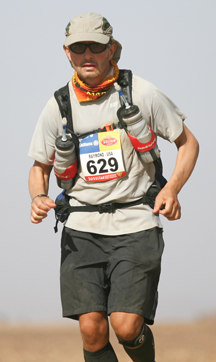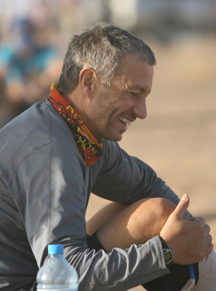

Tweet
A Race Against PKU
By Mika Ono
Vision and persistence—these are qualities Scripps Research Institute Professor Ray Stevens has demonstrated in directing his outstanding structural neurobiology program. He also displayed these traits this month in his latest venture outside the lab—completing a six-day, 156-mile ultramarathon across the African Sahara Desert.
The race, called Marathon des Sables, has been described as the toughest footrace in the world. The course, the exact details of which are not revealed until the day before the race begins, weaves over uneven, rocky ground and massive sand dunes in southern Morocco, where daytime temperatures exceeded 130°F. Competitors are required to carry all personal belongings—including food. The only exceptions are group tents and water; the water is handed out in strictly rationed portions at checkpoints.
Raising Awareness of PKU
Stevens, who obtained a spot in last fall's lottery among ultramarathon running enthusiasts for the opportunity to compete in the 900-person race, is using the opportunity to raise awareness of a disease called phenylketonuria (PKU). A rare, inherited metabolic disorder, PKU patients are unable to metabolize an essential amino acid called phenylalanine, which puts patients at risk for severe neurological complications, including IQ loss, memory loss, concentration problems, mood disorders, and in some cases, severe mental retardation.
"This event for me in part symbolizes PKU drug discovery and all of the researchers, families, foundations in the PKU community that have come together with the common goal of finishing a long drug discovery race," said Stevens, who wrote about his adventures on the website of the National PKU Alliance website, where Stevens serves on the Scientific Advisory Board. "Running this race is like developing treatments for PKU—three steps forward, one step back, but one just has to keep moving forward and eventually one WILL cross the finish line."
In his laboratory, Stevens' work represents important advances in PKU research. In breakthrough findings, his group solved the structure of the liver-produced enzyme phenylalanine hydroxylase (PAH), deficient in people with PKU. His team then helped develop a molecule now in clinical trials with the company BioMarin; the compound, PEG-PAL®, works by degrading Phe so it doesn't build up in the body of PKU patients. The Stevens lab also helped with the development and analysis of patient samples from those individuals who respond to another recently developed (and now marketed) drug for PKU called Kuvan®.
Ready, Set, Go
On the first day of the Marathon des Sables April 3, Stevens felt as ready as he was going to be.
He had trained in a 160° sauna. He had run "a lot." And, with his doctor, he had tried to manage the tendinitis that had sprung up in the left ankle and the pain in the shin of his left leg from overtraining, although neither had fully healed.
In the preceding days, he had also packed and repacked his supplies, trying to minimize their weight. On the day of the race, on his back he was carrying: 2,000 calories of food per day for seven days (including oatmeal, freeze dried packages, almond peanut butter, and pop-tarts), electrolyte powders, a sleeping bag, headlamp and batteries (for running at night), as well as other required gear—an emergency space blanket, a whistle, a signal mirror, a compass, a knife, a first aid kit, a lighter, and a scorpion venom pump (because you never know when you are going to be bit by a scorpion).
The race started mid-morning April 3, when the blazing heat was beginning to emerge. The first day's course, about 21 miles, included crossing the largest sand dunes in the Sahara, where many of the runners (including Stevens, whose left leg also began to swell) picked up severe blisters. The physicians in the medical tent were busy "fixing a lot of feet."
The second day's course consisted of about 24 miles, followed by a third day of another 24 miles. Stevens struggled with increasing nausea from dehydration. He vomited twice near the third day's final checkpoint.
The next day presented the longest stretch—51 miles and one of the hottest days of the race. After the first 18 miles, Stevens was so dehydrated he was put on an IV (one IV is allowed per participant; require a second and you are forced to withdraw from the race). "I had to lay in the sand with a needle in my arm that cost me time," Stevens wrote, "but after 1 liter of saline solution and 1.5 liters of glucose solution, I felt great being fully hydrated and managed to run 32 miles straight to the long stage finish line, crossing at 3:58 AM..." He noted he was especially motivated to complete the stage before the sun came up on the fifth day; rumors had been circulating around camp that temperatures were reaching 131°F.
By the sixth day, the 26-mile marathon stage, Stevens "had his head down, just putting one foot in front of another." Finally, came day seven, 11 miles—and then the finish line!
Climbing the Next Mountain
Does Stevens think the race was worth it? "Absolutely, I enjoyed it fully (which is easier to say now the pain has gone away)." What was his favorite part? "Turning off my headlamp in the middle of the night on the 51 mile long stage… and running up the cold dunes in the dark looking at the stars." Would he do it again? "No way… It was a once-in-a-lifetime dream." His next challenge? "Well, there is this mountain called Everest that I have been thinking about…"
In the meantime, he will be tackling other monumental challenges in his Scripps Research lab including his long career endeavor, understanding how G-protein coupled receptors work and how the insight can be used to treat diseases, particularly rare childhood diseases.
For more information on the Stevens lab, see http://www.scripps.edu/research/faculty/stevens. For more information on PKU and the National PKU Alliance, visit the organization's websites at http://www.PKUHeroes.org or http://www.npkua.org or call (715) 437-0477.
Send comments to: mikaono[at]scripps.edu



"Running this race is like developing treatments for PKU—three steps forward, one step back, but one just has to keep moving forward and eventually one WILL cross the finish line," says Scripps Research Professor Raymond Stevens of the grueling 156-mile Marathon des Sables.
